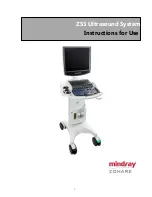
10
G-Probe
®
Device Operator Manual
13105-EN Rev E
5
Safety and Compliance
To ensure safe operation and prevent hazards and unintended exposure to the laser beams, read and
follow these instructions:
• To prevent exposure to laser energy, except as a therapeutic application from either direct or
diffusely reflected laser beams, always review and observe the safety precautions outlined in the
operator manuals before using the device.
• This device is intended for use only by a qualified physician. The applicability of the equipment
and treatment techniques selected is your sole responsibility.
• Do not use any device if you think it is not functioning properly.
• Laser beams reflected from specular surfaces can harm your eyes, the patient’s eyes, or others’
eyes. Any mirror or metal object that reflects the laser beam can constitute a reflection hazard.
Be sure to remove all reflection hazards near the laser. Use non-reflecting instruments whenever
possible. Be careful not to direct the laser beam at unintended objects.
CAUTION: Changes or modifications not expressly approved by the party responsible for
compliance could void the user’s authority to operate the equipment.
Protection for the Physician
Eye safety filters protect the physician from backscattered treatment laser light. Integral eye
safety filters are permanently installed in every compatible Slit Lamp Adapter and Laser Indirect
Ophthalmoscope (LIO) for endophotocoagulation or for Operating Microscope Adapter (OMA) use, a
separate discrete eye safety filter assembly must be installed into each viewing path of the operating
microscope. All eye safety filters have an optical density (OD) at the laser wavelength sufficient to
permit long-term viewing of diffuse laser light at Class I levels.
Always wear appropriate laser safety eye wear when performing or observing laser treatments with
the unaided eye. Refer to laser console Operator Manual for laser safety eye wear minimum OD, it is
specific per each laser console wavelength and maximum power output.
Protection for All Treatment Room Personnel
The Laser Safety Officer should determine the need for safety eyewear based on the Maximum
Permissible Exposure (MPE), Nominal Ocular Hazard Area (NOHA), and Nominal Ocular Hazard
Distance (NOHD) for each of the delivery devices used with the laser system, as well as the
configuration of the treatment room. For additional information, refer to ANSI Z136.1, ANSI Z136.3,
or European Standard IEC 60825-1.



































